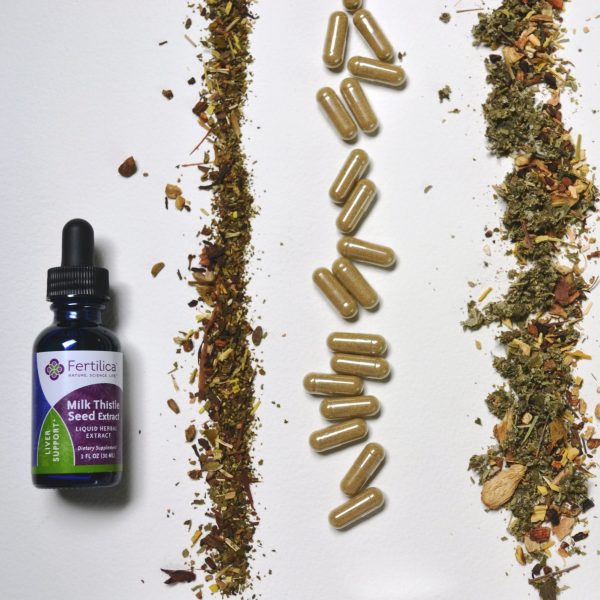Your body is beautifully designed to be self-cleansing! The liver/gallbladder, bladder/kidneys, colon/bowel, lungs, lymph and even the skin all cleanse on a regular basis. Sadly, given our modern diet and lifestyles, these organs can become overburdened, get bogged down and aren’t able to cleanse as efficiently as they naturally know how. Fertility Cleansing supports the body by using cleansing therapies such as specifically designed teas, herbal supplements, broths and fresh juices, to encourage healthy cleansing. Cleansing truly improves the functioning of all of the body systems, including the reproductive system.
Living Your Most Fertile Life
In the modern era, cleansing is critical, especially for reproductive health and fertility. Current USDA research shows that about 85% of the food supply is contaminated with pesticide residues, fungicides and weed-killing chemicals. Unfortunately, most of these chemicals are xenoestrogens that have known endocrine system, hormone-disrupting effects. New food technologies like genetically modified foods (GMO’s) may also impact long-term human reproduction.
Given what we know about chemical exposure and reproductive health, we encourage you to choose organic whenever possible. Do your best to avoid soft plastics (another xenoestrogen source), and actively choose only natural cleansers, makeup and personal care items.
Even with these changes, some chemical exposure is a natural consequence of modern life. We can help purify our bodies and renew our fertility by choosing to cleanse twice a year. A Fertility Cleanse helps eliminate chemicals we may be exposed to and gives our bodies and hormonal systems a fresh start.
Science’s Take on Fertility Cleansing Herbs
Some of the evidence of the benefits of fertility cleansing comes from oral tradition passed on from healers to their communities, along with testimonials and feedback from satisfied clients we work with. Yet, there is research that supports the advantages of fertility cleansing herbs.
1. Milk Thistle Seed (Silybum marianum): One of our favorite herbs for the liver cleansing phase of a Fertility Cleanse is the mighty Milk Thistle seed. Milk thistle seed has been studied extensively and here’s what science finds:
- Clinical studies find silymarin, a constituent in Milk Thistle seed, can help the body detoxify from drugs, alcohol and chemical toxins.
- The National Cancer Institute finds silymarin protects against cell damage and even stimulates repair of liver tissue.
As fertility herbalists, we find Milk Thistle Seed Extract is a great choice for men who have fertility issues related to lifestyle habits like drinking alcohol in excess or smoking. It is also helpful for women who have taken courses of fertility drugs or hormonal contraceptives.
2. Red Raspberry leaf (Rubus idaeus, spp): Red Raspberry leaf is another important herb we use for fertility cleansing for women, specifically for the uterus. Here’s what science tells us about Red Raspberry leaf:
- Animal research suggests Red Raspberry leaf may be able to relax the smooth muscles of the uterus.
- Australian research finds Red Raspberry leaf may be able to shorten labor and reduce chances of labor complications. Important: We only suggest using herbs in pregnancy with guidance from a qualified midwife or clinical herbalist.
As fertility herbalists, we use Red Raspberry leaf for its vitamin C content, high minerals and astringent properties. Red Raspberry leaf is an excellent herb to normalize menstrual flow and tone the uterus during a Fertility Cleanse.
3. Seaweed: Seaweed is another excellent choice for cleansing, especially for men. Many men are exposed to chemicals that affect fertility on the job. Painters, smokers, men who work in agriculture, who are exposed to solvents, heavy metals or radiation are especially at risk. Seaweed can help purify the body from these chemicals. Here’s what science tells us about seaweed:
- Studies done at the McGill University show algin, a component of seaweeds like kelp, wakame and sea palm fronds, can bind to radioactive particles, heavy metals, and other chemical pollutants in the intestinal tract, allowing them to be safely eliminated from the body.
As fertility herbalists, we use seaweed in capsules during male fertility cleansing. Men and women can also include seaweeds like Arame, Kelp, Kombu, Wakame, etc. in their everyday diets.
To see products containing Fertility Cleanse herbs, learn more about the:
Try a Cleanse For Your Fertility
Why not kick off your natural fertility program with a cleanse? Fertility cleansing herbs support your body’s natural detoxification processes. If you’ve been feeling sluggish, have a low immune response, are exposed to chemicals or need a break from unhealthy diet choices, a Fertility Cleanse can help your body renew and repair. A Fertility Cleanse sets the foundation for becoming your most healthy, fertile self while working on your program.
- Mnif, W., Hassine, A. I., Bouaziz, A., Bartegi, A., Thomas, O., & Roig, B. (2011, June). Effect of Endocrine Disruptor Pesticides: A Review. Retrieved from https://www.ncbi.nlm.nih.gov/pmc/articles/PMC3138025/
- Gillan, C. (2016, Nov.). New USDA Data Shows 85% of Foods Tested Have Pesticide Residues. Eco Watch. Retrieved from: https://www.ecowatch.com/usda-pesticide-exposure-2105041546.html
- Milk Thistle. (2017). University of Maryland Medical Center. Retrieved from: http://www.umm.edu/health/medical/altmed/herb/milk-thistle
- Stiehl, C. (2016, Sept.). The Supplement You Should Absolutely Consider If You Like To Drink. Thrillist. Retrieved from: https://www.thrillist.com/health/nation/milk-thistle-benefits-side-effects-uses-liver
- Milk Thistle PDQ. (2017). National Cancer Institute. Retrieved from: https://www.cancer.gov/about-cancer/treatment/cam/hp/milk-thistle-pdq
- Dekkar, R. (2017, July.). Natural Labor Induction Series: Red Raspberry leaf leaf Leaf. Evidence Based Birth. Retrieved from: https://evidencebasedbirth.com/natural-labor-induction-series-raspberry-leaf/
- Bowden, J. (2017, June). The 150 Healthiest Foods on Earth, Revised Edition. Fair Winds Publishing





